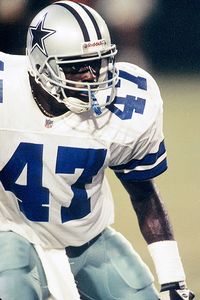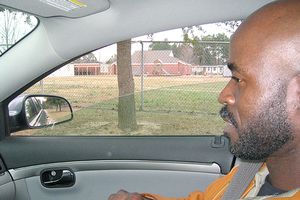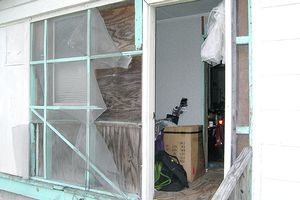- Messages
- 79,339
- Reaction score
- 45,865

By Jeff Pearlman
Special to Page 2
(Archive | Contact)
Updated: January 30, 2008, 10:04 AM ET
The e-mails came. And came. And came and came and came and came. In the aftermath of my Jan. 10 piece on former Dallas Cowboys defensive back Clayton Holmes, I received between 250 and 300 e-mails. Some were nasty. Some were joyful. Some were dismissive.
Most, however, were concerned. They wanted to know one thing: Will Clayton Holmes be OK?
Rise and fall
Read Jeff Pearlman's original piece on the rise and fall of former Cowboys defensive back Clayton Holmes:
• From a Benz to a bike
Back then, my answer was a glum "I'm just not sure." Holmes, for those who didn't read the piece, is a 38-year-old three-time Super Bowl winner who, at the time of publication, was broke and living in a decrepit shack in the front yard of his mother's home on the east side of Florence, S.C. Though he had earned enough money in the early 1990s to purchase a large house and multiple automobiles, Holmes was never able to mentally overcome a boyhood during which he was physically and sexually abused. He blew his earnings on drugs and strippers, fathered four children with four women, attempted suicide, was banned from the NFL for multiple substance abuse violations, held a series of low-paying jobs and wandered aimlessly from one city to another.
By the time he moved back to his hometown of Florence three years ago, Holmes was a battered man. "I want to do the right things," he told me recently. "But I don't always know how."
 Jonathan Hayt/WireImage.com
Jonathan Hayt/WireImage.com
Clayton Holmes is beginning a new chapter of life in Washington, D.C.
When the ESPN.com piece ran on Jan. 10, Holmes says he felt as if a 100,000-pound sack was removed from his back. All the things he had long wanted to express -- the anger toward his mother and father; the fear of the older brother who molested him; the endless negativity of his youth; the blown money; the drugs -- well, to Holmes it was one long, powerful, anxiety-clearing scream. "It was such a joy to get all that out there and in the open," he says. "I can't tell you how much better I feel … how renewed I am."
Throughout his life, Holmes often reacted to dramatic moments by doing, well, nothing. He'd retreat within his shell, make excuses, lock himself in a room, turn up the music and pretend life didn't exist.
This time, however, something snapped. Three days after the article ran, Holmes packed up his belongings and moved to Washington, D.C., where he now resides in the spare bedroom of a house belonging to Terrance Thomas, a childhood friend and Marine Corps officer.
Terrance and his wife, Mary, took Holmes in not as a charity case, but as a man bursting with potential. "What Clayton needed, more than anything, was to free himself of the burdens he carried," says Terrance. "Something in him finally said, 'It's time.' I -- for one -- believe in him."
Having spent significant time with Holmes, I -- for one -- do, too. Upon arriving in the nation's capital, he immediately contacted the Church of Scientology, a religious movement that had long intrigued him. For the ensuing two weeks, he rose at 5:30 a.m., took the Metro to the church and spent the entire day studying. He recently completed his first Scientology course -- one of the proudest academic achievements of his life. "I already see my studying skills improving," says Holmes, who suffers from ADD and is 17 credits shy of graduating from Carson-Newman College. "I know a lot of people look at Scientology and think it's hearsay or think of Tom Cruise, but I'd encourage people to read about it before making a judgment. All I know is it's helped me gain a proper perspective and outlook on certain things. I hope people choose not to bash Scientology and instead look at me as a person who is in the process of figuring out how to create a better environment for kids."
Holmes is equally excited by a renewed career path as a motivational speaker. In the aftermath of the ESPN.com article, he received myriad job offers, ranging from sales to personal training (his on-again-off-again profession in Florence). The one that struck him, however, was an invitation from Youngstown State University to come to Ohio and address student-athletes on his jarring rise to NFL glory and even more jarring fall to near-homelessness. Holmes is an eloquent orator who tells his story with brutal honesty. He accepted the Youngstown invite, and will be speaking at the school on Feb. 8.
"How many people get the chance to use their mistakes as a way to guide others?" says Holmes, who is also scheduled to address a handful of Washington-based Boys & Girls Clubs. "I'm far from the perfect role model. But I hope my life can serve as a way to show parents what negativity does to children; to show people that just because one day you're wealthy and famous doesn't mean you can't end up in the other extreme."
With assistance from Terrance and Mary, Holmes recently printed up business cards and brochures. (Those interested in contacting Holmes can reach him at: [email protected]). He is also in discussions with a local gym to begin training athletes once again.
Perhaps most important, Holmes says he is determined to make renewed efforts to reach out to his children.
"As an adult, you tend to forget how you felt as a kid," he says. "One thing I've thought about a lot lately is how I craved love and affection and support as a child. Well, my kids deserve to have what I didn't.
"When the ESPN story came out, the only former teammate I spoke to was (Cowboys safety) James Washington. No one else called or wrote. I'm not mad, but it hurt a little. They talk about a team being a family, but truthfully, it's just a team. Your kids … those are your real family. Your real blood. I need to embrace that again."
Will he succeed? Will he fail? Is he the next Zig Ziglar?
Hard to say.
But, for the first time, Clayton Holmes' path is righteous.
Jeff Pearlman is a former Sports Illustrated senior writer and the author of "Love Me, Hate Me: Barry Bonds and the Making of an Antihero," now available in paperback. You can reach him at [email protected].
LINK
Special to Page 2
(Archive | Contact)
Updated: January 30, 2008, 10:04 AM ET
The e-mails came. And came. And came and came and came and came. In the aftermath of my Jan. 10 piece on former Dallas Cowboys defensive back Clayton Holmes, I received between 250 and 300 e-mails. Some were nasty. Some were joyful. Some were dismissive.
Most, however, were concerned. They wanted to know one thing: Will Clayton Holmes be OK?
Rise and fall
Read Jeff Pearlman's original piece on the rise and fall of former Cowboys defensive back Clayton Holmes:
• From a Benz to a bike
Back then, my answer was a glum "I'm just not sure." Holmes, for those who didn't read the piece, is a 38-year-old three-time Super Bowl winner who, at the time of publication, was broke and living in a decrepit shack in the front yard of his mother's home on the east side of Florence, S.C. Though he had earned enough money in the early 1990s to purchase a large house and multiple automobiles, Holmes was never able to mentally overcome a boyhood during which he was physically and sexually abused. He blew his earnings on drugs and strippers, fathered four children with four women, attempted suicide, was banned from the NFL for multiple substance abuse violations, held a series of low-paying jobs and wandered aimlessly from one city to another.
By the time he moved back to his hometown of Florence three years ago, Holmes was a battered man. "I want to do the right things," he told me recently. "But I don't always know how."

Clayton Holmes is beginning a new chapter of life in Washington, D.C.
When the ESPN.com piece ran on Jan. 10, Holmes says he felt as if a 100,000-pound sack was removed from his back. All the things he had long wanted to express -- the anger toward his mother and father; the fear of the older brother who molested him; the endless negativity of his youth; the blown money; the drugs -- well, to Holmes it was one long, powerful, anxiety-clearing scream. "It was such a joy to get all that out there and in the open," he says. "I can't tell you how much better I feel … how renewed I am."
Throughout his life, Holmes often reacted to dramatic moments by doing, well, nothing. He'd retreat within his shell, make excuses, lock himself in a room, turn up the music and pretend life didn't exist.
This time, however, something snapped. Three days after the article ran, Holmes packed up his belongings and moved to Washington, D.C., where he now resides in the spare bedroom of a house belonging to Terrance Thomas, a childhood friend and Marine Corps officer.
Terrance and his wife, Mary, took Holmes in not as a charity case, but as a man bursting with potential. "What Clayton needed, more than anything, was to free himself of the burdens he carried," says Terrance. "Something in him finally said, 'It's time.' I -- for one -- believe in him."
Having spent significant time with Holmes, I -- for one -- do, too. Upon arriving in the nation's capital, he immediately contacted the Church of Scientology, a religious movement that had long intrigued him. For the ensuing two weeks, he rose at 5:30 a.m., took the Metro to the church and spent the entire day studying. He recently completed his first Scientology course -- one of the proudest academic achievements of his life. "I already see my studying skills improving," says Holmes, who suffers from ADD and is 17 credits shy of graduating from Carson-Newman College. "I know a lot of people look at Scientology and think it's hearsay or think of Tom Cruise, but I'd encourage people to read about it before making a judgment. All I know is it's helped me gain a proper perspective and outlook on certain things. I hope people choose not to bash Scientology and instead look at me as a person who is in the process of figuring out how to create a better environment for kids."
Holmes is equally excited by a renewed career path as a motivational speaker. In the aftermath of the ESPN.com article, he received myriad job offers, ranging from sales to personal training (his on-again-off-again profession in Florence). The one that struck him, however, was an invitation from Youngstown State University to come to Ohio and address student-athletes on his jarring rise to NFL glory and even more jarring fall to near-homelessness. Holmes is an eloquent orator who tells his story with brutal honesty. He accepted the Youngstown invite, and will be speaking at the school on Feb. 8.
"How many people get the chance to use their mistakes as a way to guide others?" says Holmes, who is also scheduled to address a handful of Washington-based Boys & Girls Clubs. "I'm far from the perfect role model. But I hope my life can serve as a way to show parents what negativity does to children; to show people that just because one day you're wealthy and famous doesn't mean you can't end up in the other extreme."
With assistance from Terrance and Mary, Holmes recently printed up business cards and brochures. (Those interested in contacting Holmes can reach him at: [email protected]). He is also in discussions with a local gym to begin training athletes once again.
Perhaps most important, Holmes says he is determined to make renewed efforts to reach out to his children.
"As an adult, you tend to forget how you felt as a kid," he says. "One thing I've thought about a lot lately is how I craved love and affection and support as a child. Well, my kids deserve to have what I didn't.
"When the ESPN story came out, the only former teammate I spoke to was (Cowboys safety) James Washington. No one else called or wrote. I'm not mad, but it hurt a little. They talk about a team being a family, but truthfully, it's just a team. Your kids … those are your real family. Your real blood. I need to embrace that again."
Will he succeed? Will he fail? Is he the next Zig Ziglar?
Hard to say.
But, for the first time, Clayton Holmes' path is righteous.
Jeff Pearlman is a former Sports Illustrated senior writer and the author of "Love Me, Hate Me: Barry Bonds and the Making of an Antihero," now available in paperback. You can reach him at [email protected].
LINK




